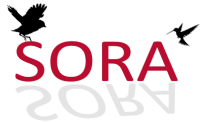The Nectar Eating Habits of the Purple Finch
The Nectar Eating Habits of the Purple Finch
In February of 1939, at my home in Berkeley, California, I noticed that the California Purple Finches (Carpodacus purpureus californicus) were singing every morning in a plum tree which was in full bloom. On closer observation the birds were seen to be plucking blossoms. Each bird worked systematically, and in one movement picked a blossom and snipped open the base; it then removed the nectar while holding the blossom in the bill, following which it dropped the blossom to the ground. Upon examination the dropped blossoms were found to be undamaged except for removal of the nectar. The birds’ unhurried swiftness was interrupted only when they paused to sing. In March the purple finches transferred their attentions to the apricot trees and continued the same procedure. Four of the eight trees which were under observation were worked consistently, while the other four trees were not. Of the four trees that were not worked one had been pruned.
In July and August when the fruit ripened, the four apricot trees whose blossoms had been thinned by the purple finches had fewer, but larger, fruits. Of the four apricot trees which had not been visited by the purple finches the three unpruned trees were loaded with small fruit. In this instance the purple finches presumably had been beneficial rather than harmful. The tree which was young and had been pruned bore fruit comparable in size and quantity to the four trees visited by the purple finches. Because observations were made for only one season, it is not possible to determine whether these results were actually brought about by the purple finches or merely coincidental to other factors such as soil fertility, moisture, insects, and the general health of the trees.
Was the nectar eating habit of the California Purple Finch formerly beneficial and is it now harmful because of the introduction of man made factors? Is this habit harmful when practiced in pruned orchards or is it of further benefit? Has this nectar eating habit always or ever been harmful, or has it had any noticeable effect? These questions should be answered at least in part by further observations. Different findings may be expected where different kinds of trees and different ecological conditions are involved.
Ned W. Stone
Berkeley, California, September 28, 1939

